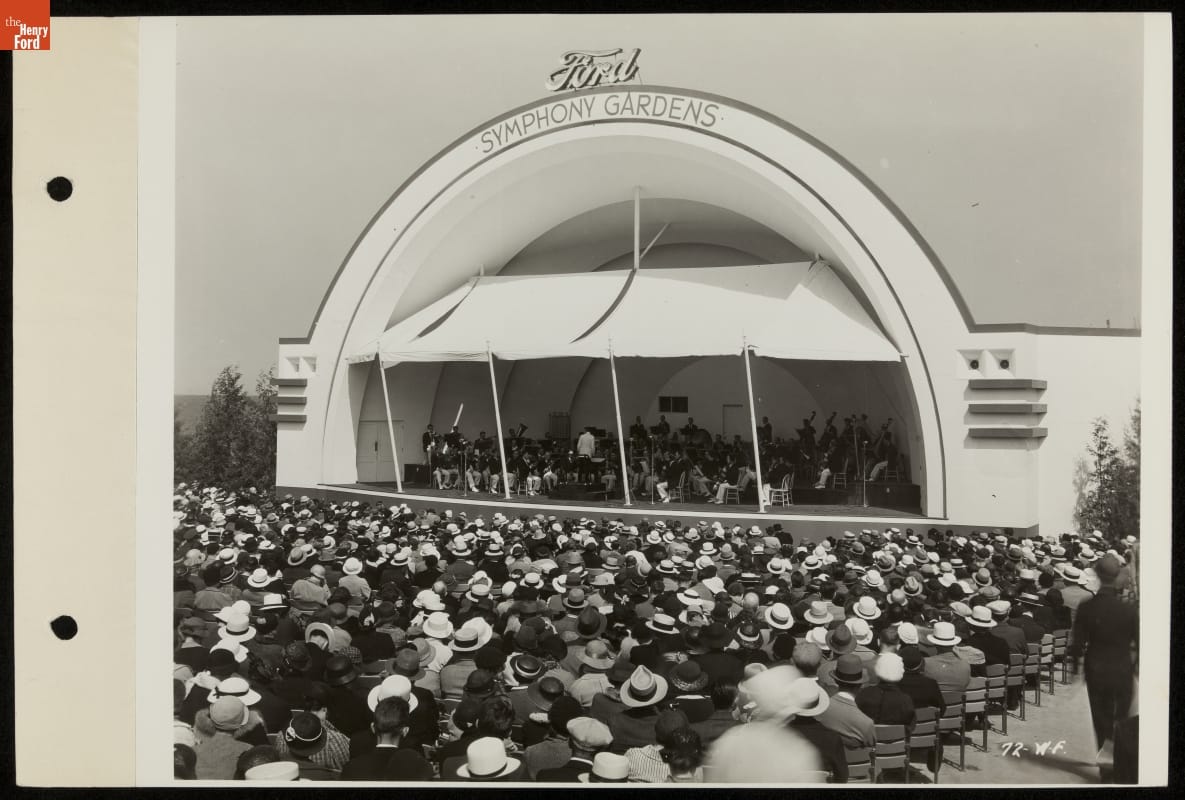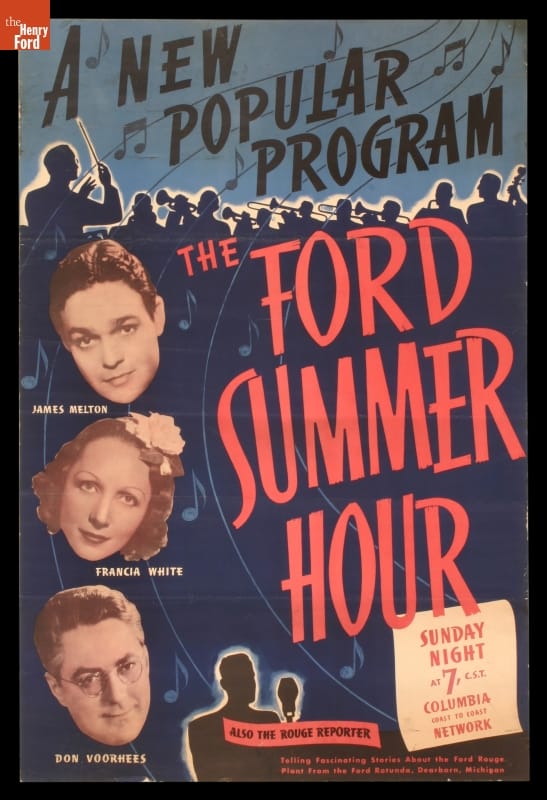Henry Ford and the Detroit Symphony Orchestra

Concert in the Ford Symphony Gardens, Century of Progress International Exposition, Chicago, Illinois, 1934. THF212561
For the past 24 years the Detroit Symphony Orchestra and The Henry Ford have teamed up for Salute to America, our annual concert and fireworks celebration in Greenfield Village. But the affiliation between the DSO and our organization goes back much farther than that.

Preparing for a Performance in Ford Symphony Gardens, Century of Progress International Exposition, Chicago, Illinois, 1934. THF212547
The connection dates back to the 1934 Chicago World's Fair, A Century of Progress International Exposition. Ford Motor Company’s exhibits were housed in the famous Rotunda building and also included the Magic Skyway and the Ford Symphony Gardens. The large amphitheater of the Symphony Gardens hosted several musical and stage acts, including the DSO, who Ford sponsored for 150 concerts over the course of the year. The symphonic notes proved so popular that Henry and Edsel Ford decided to launch a radio program featuring selections from symphonies and operas - the Ford Sunday Evening Hour. The weekly program played to over 10,000,000 listeners each broadcast over the CBS network (the same network that now presents The Henry Ford's Innovation Nation). Musical pieces were played by DSO musicians under the name Ford Symphony Orchestra, a 75-piece ensemble, and were conducted by Victor Kolar, the DSO’s associate director, for the first few years of the show. Pieces ranged from symphony classics including works by Handel, Strauss, Liszt, Wagner, Handel, Puccini, Bizet, and Tchaikovsky (including, of course, the 1812 Overture), to some of Henry Ford’s favorite traditional and folk songs like Turkey in the Straw and Annie Laurie, and even included popular tunes such as Night and Day by Cole Porter.
Each broadcast featured guest stars, soloists, and singers such as Jascha Heifetz, Grisha Goluboff, Gladys Swarthout, Grete Stükgold, and José Iturbi. The broadcast performances were open to the public for free, first at Orchestra Hall from 1934-1936, and then at the Masonic Temple 1936-1942. The show ran from 1934-1942, September-May with 1,300,000 live attendees and countless radio listeners tuning in.

Advertising Poster, The Ford Summer Hour, 1939. THF111542
Salute to America is our summer music tradition, and listeners in 1939 must have wanted some summer-themed music as well because Henry and Edsel started the Ford Summer Hour that year. Like the winter program, it was broadcast each Sunday evening on CBS, from May to September and featured a smaller 32-piece orchestra, again mostly made up of DSO musicians. Guest stars and conductors appeared, such as Don Voorhees, James Melton, and Jessica Dragonette.
The show included music from Ford employee bands like the River Rouge Ramblers, Champion Pipe Band, and the Dixie Eight. This was a program of lighter music, popular songs, and tunes from musical comedies and operettas. Apparently not everyone appreciated the lighter fare; a letter from a concerned listener stated:
“...as the strains of the trivial program of Ford Summer Show float into my room, I am moved to contrast them with the fine programs of your winter series, and to wonder why the myth persists that in hot weather the human mentality is unequal to the strain of listening to good music. Pardon me while I switch my radio to station WQXR which has fine music the year round.”
Strong words from the listening public, though apparently not the majority as the summer program rivaled the winter program with about 9,000,000 listeners per broadcast. The Ford Summer Hour, broadcast from the Ford Rotunda, only ran three seasons, but played a wide range of music for listeners such as Heigh Ho from Snow White, Dodging a Divorcee, selections from Carmen, Oh Dear, What Can the Matter Be, and One Fine Day from Madame Butterfly.
Both programs ceased by 1942 with the opening of World War II. Henry Ford II tried to bring back the Ford Sunday Evening Hour in 1945, broadcasting the same type of music by DSO musicians, but times and tastes had changed and the program was discounted after the first season.
Kathy Makas is a Benson Ford Research Center Reference Archivist at The Henry Ford. To learn more about the Ford Sunday Evening Hour or Ford Summer Hour, visit the Benson Ford Research Center or email your questions to us here.
Greenfield Village, events, Salute to America, by Kathy Makas, Ford Motor Company, Edsel Ford, Ford family, radio, world's fairs, Michigan, Henry Ford, music, Detroit


Facebook Comments